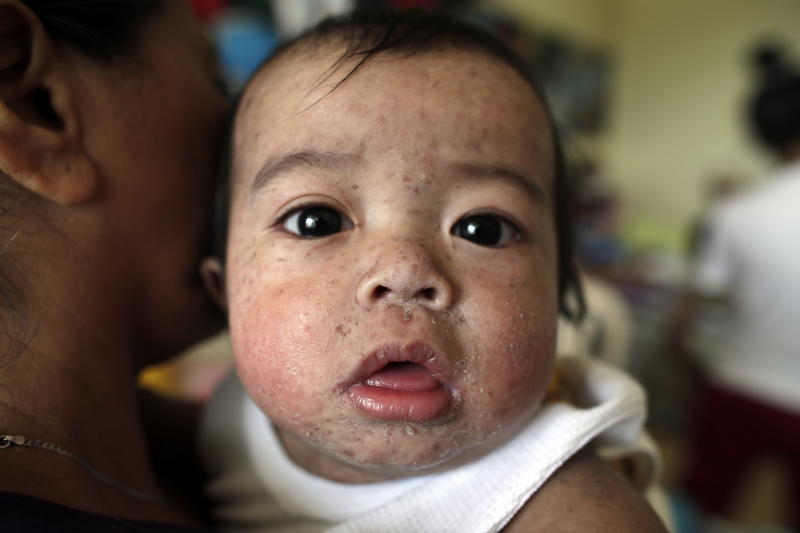Philippines hit by deadly measles outbreak after controversy over dengue vaccinations
Sign up now: Get insights on Asia's fast-moving developments

A Filipino child suffering from measles is treated at a government hospital in Manila, Philippines on Feb 7, 2019.
PHOTO: EPA-EFE
MANILA - The Philippines is battling a surge in measles cases in the capital, Manila, as well as elsewhere in the country with dozens dying from a disease which was long under control.
As many as 57 people, including infants and children, have died at the government-run San Lazaro Hospital in Manila, its spokesman Dr Ferdinand de Guzman said.
The health department believes the spike in cases are due to parents opting not to have their children vaccinated for measles and other highly contagious diseases.
Health Secretary Francisco Duque told reporters on Thursday (Feb 7) measles cases in Manila and in seven other regions had risen more than five-fold to 1,500 so far this year from just 250 a year ago.
There has been "a big, big difference", he said.
Four hundred forty one cases were reported in metropolitan Manila, which spans 16 cities and one town, a 1,125 per cent increase from last year.
In the eastern part of central Philippines, the uptick has been as high as 5,000 per cent, from just a single case a year ago to 54 as of Jan 26.
Acknowledging the health emergency, President Rodrigo Duterte ordered a "vigorous campaign" to get parents to have their children vaccinated.
"He was saddened… That's why he wanted something done immediately," presidential spokesman Salvador Panelo told reporters.
The health department and public health advocates blamed the measles outbreak on a massive health scare over Dengvaxia, the once-promising dengue vaccine introduced by the government three years ago.
"Parents, caregivers tell us they are afraid to have their children vaccinated because of Dengvaxia," said Dr De Guzman.
In early 2016, the health department, under then President Benigno Aquino, rolled out a 3.5 billion-peso (S$91 million) programme to inoculate a million school-age children with Dengvaxia to protect them against dengue, a mosquito-borne disease that afflicts hundreds of millions of people around the world.
Public health advocates opposing the programme warned at the time that the vaccine could lead to deadlier strains of the disease.
In late 2017, French pharmaceutical giant Sanofi, which licensed Dengvaxia, disclosed that the vaccine, in rare cases, could indeed backfire: If children who never had dengue are vaccinated and later become infected, the vaccine may provoke a much more severe form of the illness.
That triggered investigations in Congress. The anti-dengue programme was scrapped, and Sanofi was forced to refund 1.16 billion pesos worth of unused vaccines.
The justice department filed criminal charges against more than 30 health officials for the deaths of about 100 children which a probe by the Public Attorney's Office had linked to Dengvaxia.
On Tuesday (Feb 5), a congressional panel said Mr Aquino himself was liable for graft for backing Sanofi and pressing on with the dengue immunisation programme despite concerns over Dengvaxia.
A study last year (2018) by the London School of Hygiene and Tropical Medicine said public confidence in vaccines in the Philippines plunged to 32 per cent from 93 per cent in 2015 because of the government's "highly politicised" response to the Dengvaxia scare.
The health department reported that vaccine coverage rate plunged to 40 per cent last year (2018) from 70 per cent in 2017.
In the first three quarters of last year (2018), the number of unvaccinated children rose to over 960,000 from some 850,000 a year earlier.
On Thursday (Feb 7), Dr Duque sought to decouple the government's immunisation programme from the Dengvaxia fiasco.
"Let us not confuse the issue of Dengvaxia with other vaccines that really have been providing protection for decades," he told reporters.
Appealing to parents to have their children vaccinated, he said: "Your children's lives, their future, are in your hands. Why deprive them of protection just because of a controversy involving one vaccine?"


